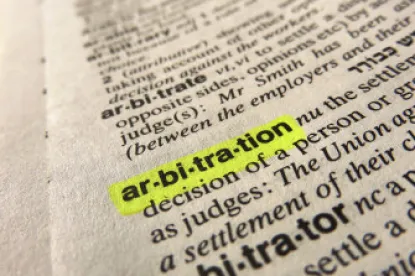Arbitrators have a special responsibility to disclose all relevant relationships to the parties so that any potential conflicts can be vetted. There are some obvious relationships that need to be disclosed like prior employment by one of the parties. There are other relationships that may be disclosed out of an abundance of caution, but typically are non-issues; like meeting one of the party representatives at an industry conference five years earlier. And of course there are the grey areas.
In a recent case, a federal court had to determine whether the non-disclosure of an arbitrator’s connection to one of the parties was significant enough to rise to the level of evident partiality.
The rules of disclosure are well-known to most arbitrators; especially those who are certified by ARIAS-U.S. Canon IV to the ARIAS-U.S. Code of Conduct provides that “[c]andidates for appointment as arbitrators should disclose any interest or relationship likely to affect their judgment.” Importantly, the canon goes on to say “[a]ny doubt should be resolved in favor of disclosure.” The latter admonition is where the disputes arise.
A New York federal court had two cases consolidated that addressed a single arbitration and motions to vacate an award for evident partiality (among other things) with a cross-motion to confirm the award. Certain Underwriting Members at Lloyd’s of London v. Insurance Co. of the Americas, No. 16-CV-323 (VSB) (S.D.N.Y. Mar. 31, 2017). The cedent’s arbitrator, who had multiple opportunities to disclose any interests or relationships, merely disclosed that he knew the attorney for the cedent, who he had some potential business dealings with 10 years earlier and affirmatively stated that he had no business relationships with the cedent or a related company.
According to the court, it turned out that the arbitrator was President and CEO of companies that operated out of the same office suite and same address as the cedent, had hired an officer of the cedent as his company’s CFO, had other officers of the cedent listed on his company’s website, shared the same claims manager with the cedent and his company’s counsel was a director of the cedent until a year before the organizational meeting. None of this was disclosed.
In vacating the award based on evident partiality, the court discussed the case law governing the evident partiality standard for vacatur under Section 10 of the Federal Arbitration Act. The court noted that clear and convincing evidence was needed. The court also cited the Supreme Court’s admonition that failure to disclose a material relationship with one of the parties can constitute evident partiality, but noted that there was no per se rule established.
While the court found that nondisclosure alone did not, taken alone, demonstrate evident partiality, the unrebutted evidence that the arbitrator failed to disclose material relationships with principals of the cedent and his own relationship with the cedent was significant enough to demonstrate evident partiality. Particularly troublesome to the court was the undisclosed relationship with the cedent’s Treasurer who the arbitrator hired as his CFO just months before the hearing and who was present at the hearing. That neither the arbitrator nor the CFO acknowledged that they knew each other during the hearing was, in the court’s view, willful avoidance and demonstrated an intent to hide the relationship.
Notably, none of the arbitrators in this case were ARIAS-U.S. certified (although the reinsurers’ arbitrator is a member of ARIAS-U.K.).




 />i
/>i

